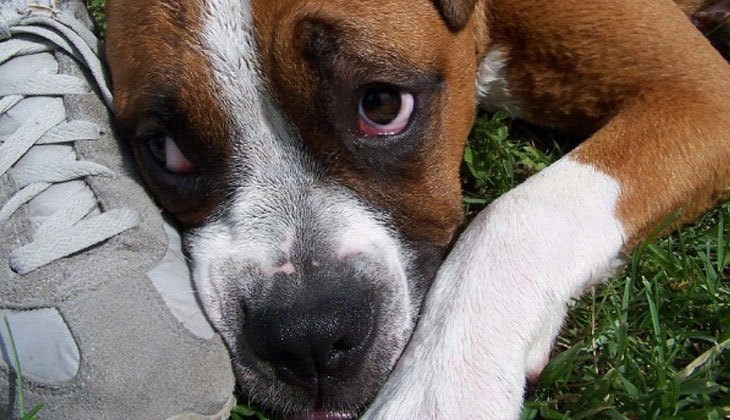
Your dog’s health through the years
CARE & NUTRITION
3 Apr, 2019
READ 9 minutes
DOG HEALTH
Looking after your dog’s health and wellbeing is a very rewarding part of your companionship. Simple measures and precautions at home combined with a regular health routine, together with regular check-ups and closely following your vet’s recommended preventative health plan will contribute to many years of happiness together. Keeping your dog healthy and happy means more enjoyable time to spend with your best friend.
Some basic things to include:
- Regular vet visits. Check-ups are part of every dog’s regular routine, for the best preventative care recommendations (e.g. anti-parasitic treatments, vaccination protocols, neutering).
- The right nutrition and a suitable, balanced diet that is appropriate for your dog’s breed, size, and activity level. Ask your vet for guidance.
- Ample time for exercise. A varied exercise routine will keep your dog stimulated and in shape – and possibly provide you with the same benefits!
- Attention to dental hygiene. Follow the steps that your vet recommends to keep you dog’s teeth and gums healthy.
- Grooming, including hair, nails, and monitoring for skin health. You could consider a visit to a professional groomer.
CONSIDERING BRINGING HOME A PURE BREED DOG OR PUPPY? LEARN ABOUT POSSIBLE DOG BREED-RELATED HEALTH PROBLEMS
Some breeds may be more prone to some types of health problems than others. It is helpful to be aware of these possible health questions. For more information on health questions to consider when selecting your companion consult ‘The guide to congenital and heritable disorders in dogs’ (Dodds, 2011), and ‘Breed, Sex and Age as Risk Factors for Various Diseases in Dogs’ (Hedhammar, 2010) are two excellent guides which will give you more in-depth information – see the web links at the end.
Providing your dog with preventative care in consultation with your vet, including diet, exercise, vaccination and parasite control is a great way to promote your dog’s overall health and wellbeing, regardless of the breed.
Book an appointment with the vet as soon as you get your new puppy or have adopted from a shelter. This is a fantastic way to get the best advice to start this new journey with your new family member.

WHAT YOU NEED TO KNOW ABOUT VACCINATION
One of the first discussions you will probably have with your vet is regarding a vaccination protocol. Vaccinations boost your dog’s immunity against infectious diseases, and are the way to protect your pet for life.
Vaccinations help your dog’s immune system to be prepared in advance against the risk of exposure to infectious diseases. Many vaccines are a small, quick injection under the skin, but others may be applied with a few drops into the nose.
Taking your dog for regular check-ups and following the recommended vaccination schedule will ensure your pet receives a high standard of care and protection.
HOW SOON SHOULD MY DOG BE VACCINATED?
When puppies are born, they receive natural protection from antibodies passed through their mother’s milk. This immunity provides a lot of protection to puppies in their first weeks of life, but as the puppy grows, this immunity declines. It is time for the puppy’s own immune system to take over, and this process is helped through vaccinations. These are normally given to puppies starting at around 6-8 weeks of age.
HOW OFTEN SHOULD I VACCINATE MY DOG?
The initial puppy vaccines will be given in a series of injections, usually a few weeks apart. Your dog will then receive additional vaccinations as it grows, and these are usually every 12 to 36 months apart, depending on the recommendation of the manufacturer. Your veterinarian can provide you with the details regarding a vaccination schedule to help protect your dog for life.
WHICH VACCINATIONS SHOULD MY DOG HAVE?
Different vaccines may be advised depending on your dog’s lifestyle and the area where you live. Examples of diseases that can be vaccinated against include:
- Canine parvovirus (Essential)
- Canine distemper (Essential)
- Infectious hepatitis (Essential)
- Canine parvovirosis (Essential)
- Leptospirosis (Optional)
- Kennel cough (Optional)
- Rabies (Essential)
Keep a record of the vaccinations given to your dog and update this when boosters are given. You may need this record when visiting your vet or traveling abroad.
WHAT RISKS SHOULD I BE AWARE OF FROM UNVACCINATED DOGS?
The excitement that your dog has in exploring the outdoors adds to the fun of a walk – dogs love to sniff, lick, and sometimes drink dirty water, but it’s all part of the journey! Your dog may also meet other dogs along the way and it is usually not possible for us to tell how healthy these other dogs are. There is also the possibility of meeting wildlife on the journey, and other animals could also be carriers of contagious illnesses, including rabies, although this is very rare.
If you have a new puppy, one of the most serious diseases to be mindful of is the parvovirus infection. Sadly, this can be deadly, but fortunately, safe and effective vaccines are available.

PARVOVIRUS
Parvovirus is a highly infectious virus that attacks a dog’s digestive tract lining. It is transmitted through exposure to virus passed in the faeces of other infected dogs. The virus can stay alive for up to a year or longer, and it is not easily inactivated – so you will usually not know that your dog was exposed. This virus can cause a serious disease and moves swiftly, so it is important to have protection from vaccination and to discuss any health concerns with your vet.
Signs of parvovirus infection can include:
- Sudden, or rapid appearance of lethargy
- Persistent vomiting
- Watery diarrhoea, sometimes with blood
- Reduced appetite
Vaccination is key in preventing this infection and protecting your dog. The vaccinations should be started while your dog is a puppy, and these vaccines are very effective at reducing the risks from this disease.
Regular anti-parasitic treatment is important, even in a well vaccinated puppy.
Ideally, your puppy’s mom should have been dewormed before birth, as some parasites can be transmitted even before they are born.
In your new young puppy, it is a great idea to give a dewormer for protection.
Your vet will be able to recommend the best deworming products, taking into account the weight and age of your puppy.

SOME HEALTH CONCERNS TO THINK ABOUT FOR ADULT DOGS
DENTAL DISEASE
Taking care of your dog’s teeth is essential from the beginning of your life together. Nowadays this has become much easier for dog owners; there are several products on the market, from specific meat-flavoured toothpaste to dental treats that will fight against dental plaque.
EARS
Occasionally dogs may develop sore ears, perhaps associated with allergies or infections. Should this occur, the signs can be a combination of itching, redness, odour or irritation. Talk to your vet about recommendations for keeping your dog’s ears clean. Dogs in some breeds – possibly those with floppy ears – may have more ear issues and need more frequent attention.
SKIN HEALTH AND ALLERGIES
Dogs can get allergies also, and these result when the immune system incorrectly identifies a harmless substance as a threat. There are many different types of allergies in dogs, including pollens, dust mites, perfumes, and even some types of food ingredients – much like humans. Flea bites can be the cause of a particularly irritating allergy for dogs, which is one of the reasons parasite control is always important for your pets. Some allergy signs can include:
- Scratching
- Red, irritated skin
- Sore ears
- Regular or constant licking
Ask your vet about recommended shampoos and other skin products. Unfortunately, some products can aggravate skin diseases. Remember that healthy skin provides a resilient natural barrier to protect your dog.
STOMACH UPSET
One of the top reasons for owners to take their dog to the vet is because of worries about vomiting and diarrhoea. Sometimes these signs occur because of food indiscretion and a reaction to something that your dog has eaten. Vomiting and diarrhoea can also be an indication of other types of illness, so be sure to call for medical help when needed. Diarrhoea in puppies can quickly cause dehydration and can be a serious problem, so contact your veterinarian and get advice on any steps that are needed.
The signs of diarrhoea are: runny, loose stools, a need to defaecate more often, or possibly an accident in the house. Other signs to
watch for include:
- An increase in stool volume
- Straining while trying to pass stools
- A change in mood
- Lethargy
- Fatigue or weakness
- Blood or mucus in the stool
Keeping a record of any signs you see, noting their severity and timing can be very helpful in discussing possible causes with your veterinarian. Also, advise the vet if you suspect that your dog may have eaten something causing a concern.
When diarrhoea is combined with repeated vomiting, then this can become a serious health problem quite quickly even in an adult dog, and your dog needs to see your vet. A single episode of vomiting without diarrhoea is not always something to worry about and may be an upset stomach that resolves itself. A quick phone call to your vet can give useful advice. An upset stomach will resolve with a fasting period for 24 hours or less, followed by a bland diet providing in small, more frequent portions.
Dogs are just like us and experience health problems that may be mild or may need a visit to the vet. Regular preventive care is the best way to keep your dog at peak health and to be alert to anything that arises that needs further attention.
DIABETES
Dogs, like humans, can also develop diabetes. This condition may develop later in life, and is much less common in younger dogs.
Some signs to watch for:
- Drinking a lot of water (excessive thirst)
- Change in appetite
- Weight loss
- Skin infections that do not go away or keep coming back
A healthy diet, a regular exercise program, and regular visits to your vet will help reduce the risk of diabetes.

CANCER
“Cancer” is not a single disease and may show up in multiple different ways, some mild and of little concern and others much more serious. Signs to watch for and discuss with your vet include:
- Lumps or growths
- Persistent skin sores or growths
- Change in appetite
- Weight loss
- Persistent lameness
- Difficulty swallowing or eating
- Difficulty breathing
These signs may also occur with many different problems and should be noted and discussed with your vet. Many forms of this disease are readily treated and options can be available that are similar to those offered to people.
Maintaining a healthy and happy companion is part of the great enjoyment you will get from your time together. Talk to your veterinarian about preventative care, including control of parasites and vacation, and get answers to your questions. The advanced health choices available today will make it easy for you to get into all kinds of places with your.
RECOMMENDED




